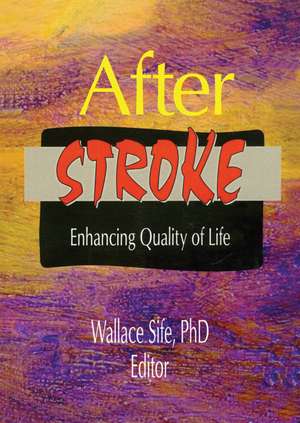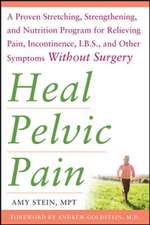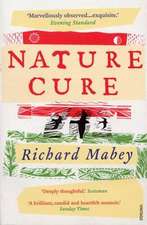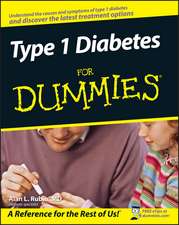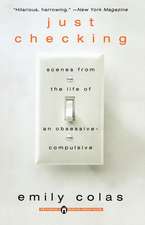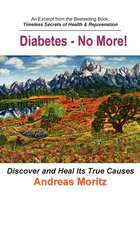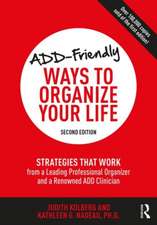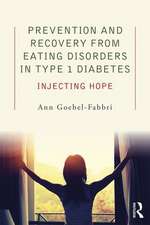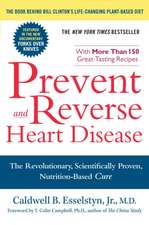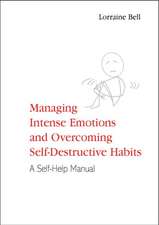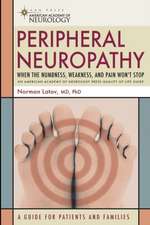After Stroke: Enhancing Quality of Life
Autor Wallace Sifeen Limba Engleză Paperback – 5 mai 1998
Recuperating from a stroke is an arduous process that has only just begun when the survivor is released from the hospital. This book shows anyone interested how to create an effective climate for healing and how to help the survivor realize his/her fullest recovery potential. It offers varied perspectives of everyone involved with a stroke: the patient, the family, and friends as well as the team of specialized physicians, nurses, psychologists, physical therapists, speech pathologists, and diverse therapists.
Through its interesting and varied essays, After Stroke: Enhancing the Quality of Life offers the reader a clearer understanding of the injuries that the body as well as the mind have sustained. This anthology is carefully designed to present enhanced perspectives into all aspects of the healing and recovery processes that follow the personal tragedy of a stroke.
Preț: 341.39 lei
Preț vechi: 510.13 lei
-33% Nou
Puncte Express: 512
Preț estimativ în valută:
65.33€ • 67.96$ • 53.94£
65.33€ • 67.96$ • 53.94£
Carte tipărită la comandă
Livrare economică 14-28 aprilie
Preluare comenzi: 021 569.72.76
Specificații
ISBN-13: 9780789003416
ISBN-10: 0789003414
Pagini: 292
Ilustrații: illustrations
Dimensiuni: 156 x 216 x 19 mm
Greutate: 0.45 kg
Ediția:1
Editura: Taylor & Francis
Colecția Routledge
Locul publicării:Oxford, United Kingdom
ISBN-10: 0789003414
Pagini: 292
Ilustrații: illustrations
Dimensiuni: 156 x 216 x 19 mm
Greutate: 0.45 kg
Ediția:1
Editura: Taylor & Francis
Colecția Routledge
Locul publicării:Oxford, United Kingdom
Cuprins
Contents
Introduction
Introduction
- Part I: Clinical Perspectives
- Pathophysiology of Stroke
- The Psychiatry of Stroke
- Focused Stroke Rehabilitation Programs: A Review of Prospective Controlled Trials
- Psychological Studies in Stroke Rehabilitation
- Stroke as Chronic Illness: Living to the Fullest
- How Common Is Depression Following Stroke?
- Stroke and Quality of Life: Intimacy and Sexuality Poststroke
- Part II: Professional Contributions
- Nursing Care of the Stroke Patient: The Essence of Healing
- Rehabilitation Nursing on a Stroke Unit
- Aphasia: Rehabilitation and Recovery from Loss
- Dysphagia: Swallowing Disorders Following a Stroke
- Management of the Communicatively Challenged Adult After Stroke: Partners in Rehabilitation
- The Speech/Language Pathologist: Bridging the Communication Gap
- The Role of Physical Therapy in Multidisciplinary Stroke Rehabilitation
- Occupational Therapy Intervention in the Rehabilitation of Stroke Patients
- Therapeutic Recreation and the Rehabilitation of the Stroke Patient
- The Nature of Suffering and the Goals of Medicine
- The Role of the Social Worker on a Stroke Rehabilitation Unit
- Part III: Personal Reflections
- Stroke! This Isn't the Script I Was Writing!
- AHA! There Is a Reason
- The Words I Lost
- Aphasia, as Seen by an Aphasic
- The Language Loss of Patricia Neal and Helen Wulf
- Self-Portrait of an Aphasic (From a Personal and Professional Viewpoint)
- The Plight of the One-Armed Paperhanger
- The Perils of Travel, Following a Stroke
- Planning a Trip When the Traveler Has a Disability
- Part IV: Healing Dimensions
- The Interests and Activities of AARP in Quality of Life Issues and Stroke Patients and Their Families
- New Concept in Stroke Rehabilitation
- Conquering Community Barriers: Stroke Rehabilitation
- Surviving a Stroke: The Miracles of Science and Spirit
- Self-Empowerment in Healing
- Index
- Reference Notes Included
Descriere
After Stroke: Enhancing Quality of Life brings together medical advice, practical survivor techniques, information about resources, and personal stories of triumph to help those who have experienced a stroke attain the highest quality of life possible. Recuperating from a stroke can be a long and arduous process, and it doesn't necessarily end when the survivor is released from the hospital. As this book shows, physicians, nurses, psychologists, physical therapists, speech pathologists, family, and friends need to employ a team approach to help the stroke survivor realize his/her fullest recovery potential. From the helpful guiding pages of this book, you will learn how to create a climate with a commitment to healing.
